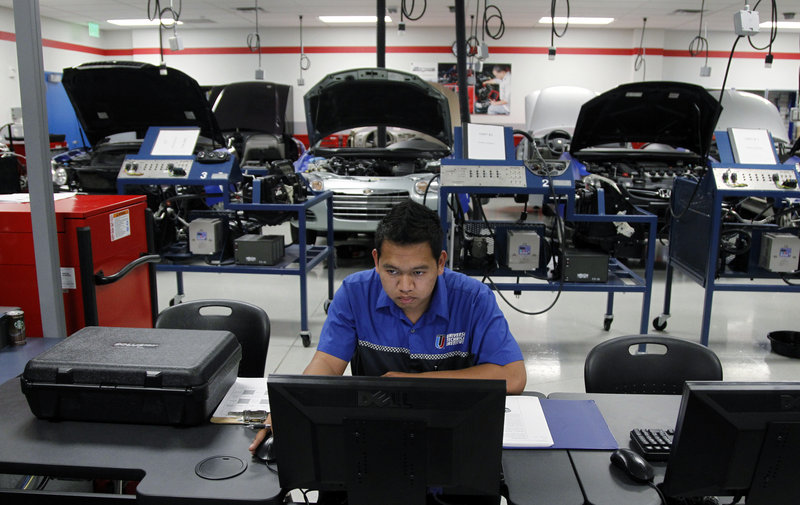DALLAS — Five years from now, rookie auto tech John Perez may be stroking computer keys more often than twisting wrenches.
“Everything I learned will probably be outdated by then,” said Perez, 19, a recent graduate of Universal Technical Institute in Irving, Texas.
As cars and trucks get increasingly high-tech – speeding toward the day in a few years when they drive themselves – the role of the back-shop mechanic is evolving dramatically. So, too, are many shops, which still keep most dealerships cruising along economically in good times and bad.
“Less work and more sophistication is what I see in the years ahead,” said Paul Taylor, chief economist of the National Automobile Dealers Association. “The future is cars that are less troublesome but more complicated.”
For more than a decade, techs such as Perez have been in high demand at car dealerships, with the best commanding wages of $70,000 or more a year.
And for just as long, the parts and service departments have been prized economic engines, often generating enough revenue to cover most of the dealership’s overhead.
That hasn’t changed – yet. But warranty work, once the mainstay of service departments, has plummeted in the past decade as vehicles got vastly better. At most shops, it dropped from around 70 percent of daily work orders to 30 percent or less.
Likewise, the intervals between maintenance work have grown. Spark plugs last 100,000 miles now, and some synthetic oil can go 10,000 miles between changes. Consequently, no one is quite sure what service departments – and their critical financial contributions – will look like in a few years.
Dealerships hustle more repair business now, an effort aided by consumers, who are keeping their vehicles longer. Many also offer express oil-change and service facilities to compensate somewhat for the loss of warranty work.
And some are planning different types of service departments altogether. Five Star Ford in Carrollton, Texas, for example, is designing a new dealership facility that will have a technology center, said owner Sam Pack. “When you look at advanced technology, we’ll have to have a different business model at our dealerships,” said Pack, who owns three other Ford dealerships. “But we will still need to provide basic repair and maintenance services.”
The technology center will be responsible for repairs to everything from lane-departure warning systems to the “connectivity” devices that hook drivers’ cellphones into their vehicle’s electronics, Pack said.
Highly regarded Dallas-area retailers such as Park Place Dealerships and Sewell Automotive Cos. lobbied UTI to establish the nearby campus, one of 11 centers the school has nationwide.
But tech demand is a bit murky. In 2008, the U.S. Bureau of Labor Statistics concluded in its 10-year outlook that job growth in the auto-tech field would be below average, increasing only 5 percent.
However, dealers say, that study failed to foresee many of the changes that are already occurring.”Even as warranty work declined and quality from the manufacturers increased, we saw a shift in the type of work that techs were doing – but not a decline in work,” said Tony Carimi, director of fixed operations at Park Place Dealerships, which employs about 350 techs.
Moreover, some consumers take loans these days of up to 84 months to reduce their payments, buying extended warranties to help cover repair expenses, said Tom Durant, who owns six area dealerships. That generates more service work.
“No matter how good you make cars, people will still be having wrecks, still misusing them,” said Durant, whose dealerships include Classic Chevrolet in Grapevine, Texas, the top-selling Chevy store in the U.S. for the past six years.
Send questions/comments to the editors.



Success. Please wait for the page to reload. If the page does not reload within 5 seconds, please refresh the page.
Enter your email and password to access comments.
Hi, to comment on stories you must . This profile is in addition to your subscription and website login.
Already have a commenting profile? .
Invalid username/password.
Please check your email to confirm and complete your registration.
Only subscribers are eligible to post comments. Please subscribe or login first for digital access. Here’s why.
Use the form below to reset your password. When you've submitted your account email, we will send an email with a reset code.